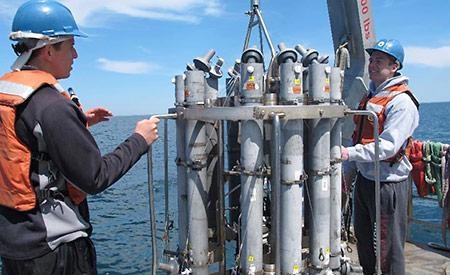It’s the school that has taught 78 Nobel laureates, 52 National Medal of Science recipients and 45 Rhodes Scholars. Now, it’s teaching one of Powell River’s own.
Ben Lambert, who graduated from Brooks Secondary School in 2008, just completed his first year at the Massachusetts Institute of Technology (MIT) in Boston. His aim is a joint degree in applied ocean science and engineering and civil and environmental engineering.
The joint program is in partnership with Woods Hole Oceanographic Institution, one of the premier marine science centres in the world. At the end of the five-year program, he will finish with a PhD.
Lambert’s specific area of research is phytoplankton ecology. He said people don’t realize how important phytoplankton is. “It’s like the basis of everything,” he laughed. Studies show between 50 and 90 per cent of the oxygen on earth is produced by phytoplankton.
In regard to his work, Lambert explained that he’s more on the engineering side. “I build devices for people to study things with,” he explained. This year, he worked on multiple projects. One example was a submersible float cytometer, which takes pictures and identifies phytoplankton using lasers and light sensors.
Lambert’s program involves classes on extremely specific areas of interest, ranging from the study of larvae and their environments to biophysical interactions in the pelagic zone, the top-most part of the ocean.
As part of his program, Lambert also completed diving training with the American Academy of Underwater Sciences. The class taught technical diving, or how to deploy and fix instruments underwater. “It’s awesome,” said Lambert. “Now I go diving off of Martha’s Vineyard all the time to put in instruments.”
In the course of his first year, Lambert has had many incredible opportunities. One was attending the Microscale Interactions in Aquatic Environments conference, which took place in the French part of the Alps.
Lambert is still incredulous about the experience. “I got to meet the founding people in the field and talk to them over breakfast,” he said. Now, every time there is a popular paper in his field, he can put a face to who wrote it.
Lambert was surprised by the conference as well. “It’s really kind of goofy, because scientific conferences are like science fairs for adults,” he explained.
Lambert said he expects this coming school year will be even better, explaining how he will be attending conferences in Hawaii and South Korea.
Other benefits also come with a place at a prestigious science school. “It’s really unlike any other place in the wold, because if you need something, then it’s made available to you,” Lambert explained. He said that although campus buildings are old, labs are almost space age in the scope and quality of their equipment.
For Lambert though, going to MIT wasn’t always the master plan. After obtaining a degree in environmental engineering at the University of Alberta, all he knew was that he wanted to study the ocean.
“There really wasn’t—surprise—much schooling on the ocean in Alberta,” Lambert explained, “so I looked to do other masters programs, and basically every single person I was interested in working with had done this program at MIT.”
Though he was accepted at many other schools, Lambert was only put on the wait list for the MIT program.
Then, he received a surprise phone call from MIT advisors saying he had a place in the program if he wanted it.
“They pitched this project, and I thought, wow, this is actually super cool. I just decided I was going to go for it,” Lambert explained.
He was admitted to the program with full funding, which he said is pretty standard for schools like MIT. Programs are extremely exclusive. In Lambert’s year, there is only one other person in his specific discipline.
Lambert’s first year has not been without its challenges though. One came in the form of the Boston Marathon bombing. “That was actually pretty terrifying, because I’ve never lived anywhere where anything like this has happened,” he said.
Lambert missed the marathon because he slept in, but some of his friends were near the finish line when the bomb exploded.
The situation escalated when only a few days later, the remaining bomber shot a security officer on the MIT campus. Lambert was only a block away, playing floor hockey. The gym went on lockdown and those inside weren’t let out until 2 am, even though the bomber hadn’t yet been caught.
“You could hear helicopters flying over and everything,” said Lambert, adding that it was like something out of a movie.
Lambert has put the terrifying drama behind him though, and is looking forward to returning to the school for another year. “I really stumbled upon [the program], and now I’m doing so many awesome things,” he said. “I’m so lucky to be here.”



